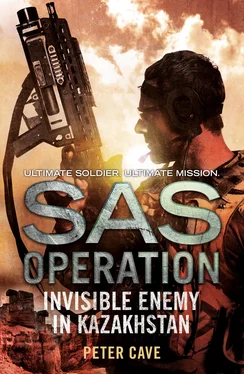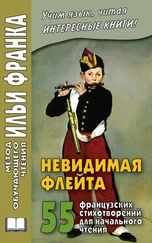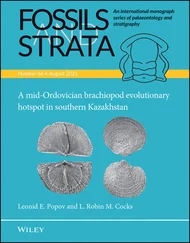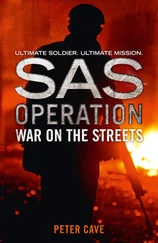Grieves nodded. ‘In essence, yes.’
‘Have the Chinese any direct evidence for this?’ Davies asked. ‘Have there been any actual deaths?’
Grieves consulted his notes briefly. ‘It’s difficult to be absolutely sure,’ he replied. ‘You have to understand the unique background and make-up of Kazakhstan itself. It’s vast – almost unbelievably so. You could fit Britain, France, Germany, Spain, Finland and Sweden into it quite comfortably. Yet it only has a total population of some seventeen million – an improbable mix of races and cultures including native Kazakhs, Tartars, Uzbeks and Uigurs along with emigrant Russians, Germans and others. In Stalin’s heyday, Kazakhstan was Gulag territory. When the concentration camps were disbanded, many of the inmates settled in the area. Stalin also used the region as a dumping ground for vast numbers of people he considered “political undesirables” – Volga Germans, Meskhetian Turks, Crimean Tartars and Karachais to name but a few. So we’re talking about millions of square miles still sparsely populated by people of widely differing religions, cultures and languages. And we are also dealing with a particularly remote region, in mountainous terrain not far from Mount Belushka. Because of the nature of this terrain, and the scattered, semi-nomadic distribution of the peasant population, there is no direct communications network. Any information which comes out of the area is essentially rumour, or word-of-mouth reports which might have been passed through several dozen very simple people before reaching the ears of the authorities. However, there are enough reports of dead and missing goatherds, peasant farmers and the like filtering through to give these Chinese fears some credibility.’
‘So why can’t they go in and sort it out for themselves?’ Davies asked. ‘After all, they’re right there on the spot.’
Grieves did not attempt to answer. Instead, he glanced towards the Foreign Secretary.
‘With respect, Lieutenant-Colonel,’ said the latter, addressing Davies directly, ‘you’re looking at this through the eyes of a military man, without taking into account the highly complex and sensitive political issues involved here. This whole region is a territorial minefield. There have been border clashes between the Chinese and Russians for the last three decades, and stability balances on a knife-edge. The Chinese don’t dare to make a serious incursion into Russian territory for fear of sparking off a major incident.’
‘Then it’s up to the Russians to sort it out for themselves, surely?’ Davies suggested.
The Foreign Secretary smiled thinly. ‘Perhaps you’re forgetting that there is virtually no longer any centralized decision-making inside former Soviet territory,’ he pointed out. ‘Every region, every state is in turmoil – fragmented and politically unstable if not actively in the throes of civil war. The Kazakhstan region is no exception. There are perhaps up to half a dozen different guerrilla groups and political and religious factions already fighting for territory virtually on a village by village, valley by valley basis. You only have to look to Georgia, just across the Caspian, to get an idea of what’s going on there.’
Davies nodded thoughtfully. Grieves coughed faintly again, drawing attention back to himself.
‘Actually, to answer Lieutenant-Colonel Davies’s last question, I ought to point out that we believe the Russians did manage to send in at least one military team to investigate,’ he volunteered. ‘Our intelligence suggests that they disappeared without trace, with absolutely no clues as to what happened to them. We have no way of knowing if they even managed to get anywhere near the research facility.’
‘But I still fail to understand how the Chinese reckon to get us involved in all this,’ Davies said, becoming increasingly bogged down in the political intricacy of the entire affair.
The Foreign Secretary treated him to another thin, almost cynical smile. ‘Politics sometimes makes for strange bedfellows,’ he said. ‘The Chinese are desperate for Western acceptance after the Tiananmen Square massacre. They are equally desperate for access to European trade markets, and, rightly or wrongly, they seem to believe that Britain could be holding the top cards in the Euro-deck right now. And, as we are already involved in close association over the Hong Kong business, they feel they have an ace of their own to play.’
Davies started to understand at last. ‘So it’s a threat, basically?’ he said. ‘Unless we play ball with them, they’ll make the Hong Kong negotiations more difficult?’
The Foreign Secretary smiled openly now. ‘I see you’re beginning to get a grasp of modern-day diplomacy,’ he murmured, without obvious sarcasm. He paused to take a slow, deep breath. ‘So, Lieutenant-Colonel Davies, that’s it, in a nutshell. We appear to be stuck with the problem, and the SAS would appear to be our only hope.’
‘To do what, exactly?’ Davies demanded. He was still not quite sure what was actually being asked of him.
The Foreign Secretary stared him directly in the eye. ‘To get in there, monitor the situation and neutralize it if possible. Of course, you understand that we are talking about some of the most difficult and inhospitable terrain in the world, under the most extreme climatic conditions. As I understand it, the difference between daytime and night-time temperatures can be as much as 20°C. Once you’re up into the mountains, you can expect extremes as low as minus thirty – plus fierce and bitter northerly winds straight down from Siberia.’
Davies nodded thoughtfully. ‘Not exactly the Brecon Beacons,’ he muttered. The reference to the SAS testing and training grounds went over the top of the Foreign Secretary’s head.
‘You would, of course, be given the full support of the Intelligence Corps and access to all the relevant files,’ the latter went on. ‘You would be expected to liaise with Captain Baker about the finer points of the operation, including more detailed briefing about the geography of the region. All I require from you at this stage is a gut assessment as to the feasibility of the operation. In short, could your men get a small team of scientists into that complex with a reasonable hope of success?’
The last sentence was a sudden and totally unexpected sting in the tail. Davies jumped to his feet angrily, quite forgetting the company he was in as he banged his fist down on the table. ‘No bloody way,’ he shouted, vehemently.
The Foreign Secretary kept his cool admirably, merely raising one eyebrow quizzically.
‘Come now, Lieutenant-Colonel. I would have thought this was right up your street.’
‘No bloody civilians, no bloody way,’ Davies repeated, virtually ignoring him. ‘The SAS isn’t a babysitting service for a bunch of boffins who probably couldn’t even step over a puddle without getting their feet wet. If we go in at all, we go in alone. And if we need any specialist know-how, we’ll take it in our heads.’
The Foreign Secretary seemed unperturbed. ‘Yes, Captain Baker more or less warned me that that would be your reaction,’ he observed philosophically. He thought for a few moments. ‘Well, as I can’t order you, we shall have to resort to Plan B. Your men will secure the area and neutralize any obvious threat to an Anglo-Chinese team of scientific experts who will be airlifted in behind you. Can you do that much?’
Davies simmered down. ‘We can have a damned good try,’ he said emphatically. ‘What about insertion into the area?’
‘That’s one of the matters we’re going to have to discuss,’ Piggy put in. ‘But basically you’d probably have to assemble somewhere neutral like Hong Kong. You’d go in as civilians, of course – either as tourists or visiting businessmen. From there you would be contacted by the Chinese and transferred to a military base on the mainland. We would expect the Chinese to put you over the border somewhere just inside Sinkiang Province, probably 100 miles north-east of Tacheng. You would then be facing a foot trek of around 350 miles. It’s going to give you supply problems, but there’s a possibility the Chinks would be willing to risk a brief air incursion into Soviet territory to drop you one advance cache. Certainly no more, since the official Kazakhstan government is extremely well armed with the latest high-tech kit. The republic has even managed to retain nearly fifteen per cent of the former Soviet total nuclear arsenal, much to the Kremlin’s annoyance.’
Читать дальше












